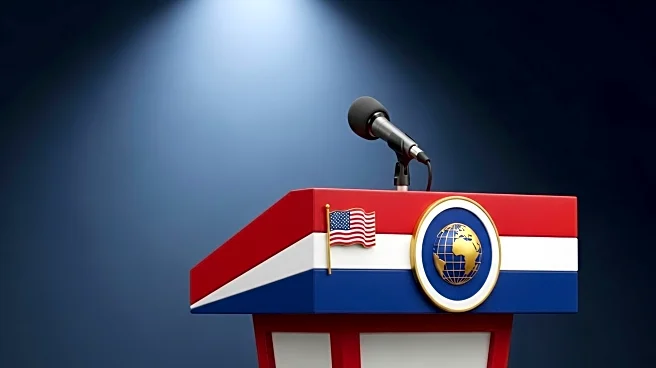What's Happening?
During a recent Cabinet meeting at the White House, President Trump made several inaccurate statements, particularly concerning vaccines. He incorrectly claimed that babies receive 82 vaccines in a single shot, which is not true according to the CDC's recommended vaccination schedule. Trump also falsely stated that vaccine doses are the size of two glasses of water, whereas a standard dose is much smaller. Additionally, he inaccurately asserted that Amish people do not take vaccines or pills and have no autism, despite evidence to the contrary. Trump also made erroneous claims about the measles vaccine being available separately, which it is not in the United States. Beyond vaccines, Trump made other false statements regarding Venezuelan drug boats, wars he claimed to have settled, prescription drug prices, and the 2020 election.
Why It's Important?
The false claims made by President Trump have significant implications for public health and policy. Misleading statements about vaccines can contribute to vaccine hesitancy, potentially affecting public health efforts to control preventable diseases. His comments on drug prices and wars may impact public perception and policy discussions, as they involve critical areas of governance and international relations. The repeated falsehoods about the 2020 election continue to fuel political division and undermine trust in democratic processes. These inaccuracies can have real-world consequences, influencing public opinion and policy decisions.
What's Next?
The continuation of false claims by President Trump may prompt responses from public health officials, political leaders, and fact-checking organizations. Efforts to correct misinformation and educate the public on vaccine safety and efficacy are likely to intensify. Political and social groups may also react to Trump's statements on the 2020 election and international conflicts, potentially leading to further political discourse and action. The impact on public trust and policy may be closely monitored by stakeholders across various sectors.
Beyond the Headlines
The broader implications of President Trump's false claims extend to ethical and cultural dimensions. The spread of misinformation can erode public trust in institutions and experts, affecting societal cohesion and the effectiveness of public health initiatives. The cultural impact of such statements may also influence attitudes towards science and medicine, potentially leading to long-term shifts in public behavior and policy priorities.








